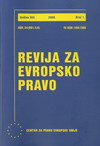PRAVNI I INSTITUCIONALNI ASPEKTI ZAJEDNIČKE SPOLJNE POLITIKE EU
LEGAL AND INSTITUTIONAL ASPECTS OF COMMON FOREIGN POLICY OF EU
Author(s): Gordana Ilić GasmiSubject(s): Politics / Political Sciences, Politics, Law, Constitution, Jurisprudence, EU-Legislation
Published by: Удружење за европско право - Центар за право Европске уније
Keywords: European Union (EU); common foreign policy of the EU; EU treaty; decision making process; Draft of the EU Constitution; effectiveness
Summary/Abstract: The issue of the development of the political identity of the EU through establishing its common foreign policy mechanisms, are equally important since early days of the establishing of the Community, in the 50-ties, when Jean Monnet has announced the following vision: "Europe cannot be limited to steel and coal integration. Establishing of the Community, as the nucleus of the future federal state, will be without sense if it does not result in the real political authority." This essay is focused on the development and implementation of the common foreign policy of the Union, aimed at giving the overview of this issues in legal and historical context of the founding treaties. The basic concept is represented, i.e. to analyze the foreign-policy decision making capacity of the Union, in order to reach conclusions on the perspectives of the EU in view of its effectiveness. Depending on the institutional reform outcome, the EU international subjectivity is at stake, as well as political and economic considerations of the EU role as a global international actor. To what extent is really formed this kind of political authority today within the European Union and does it exist federal state under the auspices of the EU institutions, is certainly very challenging research matter, without definite answer to be found in the theory nor in the practice. This essay is dealing with finding the answers to the following questions: 1. Will the EU acquire the legal personality in the international law? 2. How flexible the EU unique institutional structure is, since it is based on the three pillars, seen from the standpoint of its reforming capacity aimed at improved foreign policy decision-making and functioning? Starting hypothesis is that the EU institutional reform process remains unavoidable instrument of integration deepening and creation of the political identity of the Union. Hence comes research challenge, but at the same time beauty of writing about this topic which is very live area and evolutionary in its nature. This is logical having in mind that the Union, being dynamic system, is in the process of attaining of its legal personality. More precisely, the EU stricto sensu is not a single international law subject, because the Communities are still withholding their legal personality. However, in the new EU Draft Constitutional Treaty, the establishment of the EU’s legal personality has been foreseen explicitly. Roots of obtaining the EU’s legal capacity and international subjectivity lay in the EU Treaty from Amsterdam and Nice, in the provisions on signing of international agreements, i.e. exactly in the sphere of EU foreign policy decision-making.. Nonetheless, making the new European architecture is not a one-way street. Parallel to the deepening process, there is also the European integration widening, through the EU enlargement happening these days, by inclusion of the ten new Member States from Central and Eastern Europe, since May 2004 (and also envisaging Bulgaria and Romania to accede the EU in the 2007). EU is characterized inter alia, by strong intergovernmental methods of Member States’ cooperation, especially in the foreign policy and defense field, as well as in the area of judicial criminal collaboration, immigration and asylum policy issues (third pillar). The research result is that the EU, being permanent negotiating system, is very featured by the process of constitutionalization, through reforming constitutional treaties into the new EU Constitutional Treaty. Draft Treaty on EU Constitution has envisaged the establishment of the position of the EU Minister of Foreign Policy in near future, after its ratification process. However, the dynamics and results of this process remain to be seen in the forthcoming period especially in the field of foreign policy EU capacity. It is to be concluded that there is no definite answer to the question on the legal nature of the Union, being the new entity in contemporary international relations and international law typology. However, Member States are constituent elements of the Union entity and therefore they dictate the EU reforms path and reforms pace, which is especially obvious in the field of EU common foreign policy legal and institutional frameworks. Crucial issue of the future EU development is, according to the author’s opinion, the capacity of the Union to bring effective decisions, which is relevant from the standpoint of the internal economic sustainable growth incentives and increase of employment potentials in the EU, but also seen from the aspect of EU foreign-policy activities.
Journal: Revija za evropsko pravo
- Issue Year: 7/2005
- Issue No: 1
- Page Range: 23-49
- Page Count: 17
- Language: Serbian

